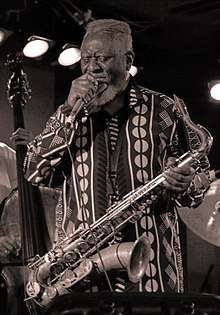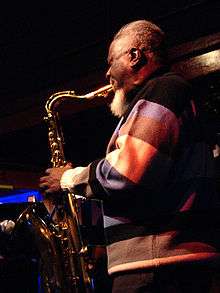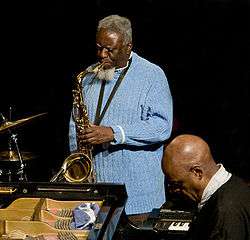Pharoah Sanders
Pharoah Sanders (born Farrell Sanders, October 13, 1940) is an American jazz saxophonist. A member of John Coltrane's groups of the mid-1960s, Sanders is known for his overblowing, harmonic, and multiphonic techniques on the saxophone, as well as his use of "sheets of sound". He has released over 30 albums as a leader and has collaborated extensively with Leon Thomas, Alice Coltrane and Tisziji Muñoz, among others. Saxophonist Ornette Coleman described him as "probably the best tenor player in the world".[1]
Pharoah Sanders | |
|---|---|
 Sanders in December 2006 | |
| Background information | |
| Birth name | Farrell Sanders |
| Born | October 13, 1940 Little Rock, Arkansas, U.S. |
| Genres | Free jazz, avant-garde jazz, world fusion |
| Occupation(s) | Musician, composer, bandleader |
| Instruments | Saxophone |
| Years active | 1964–present |
| Labels | Douglas, Theresa, Impulse!, Strata East |
Sanders' music has been called "spiritual jazz" due to his inspiration in religious concepts such as Karma and Tawhid, and his rich, meditative aesthetic.[2] This style is seen as a continuation of Coltrane's work on albums such as A Love Supreme.[3] As a result, Sanders is considered a disciple of Coltrane or, as Albert Ayler said, "Trane was the Father, Pharoah was the Son, I am the Holy Ghost".[4]
Early life
Pharoah Sanders was born on October 13, 1940, in Little Rock, Arkansas. His mother worked as a cook in a school cafeteria, and his father worked for the City of Little Rock. An only child, Sanders began his musical career accompanying church hymns on clarinet. His initial artistic accomplishments were in the visual arts, but when he was at Scipio Jones High School in North Little Rock, Sanders began playing the tenor saxophone. The band director, Jimmy Cannon, was also a saxophone player and introduced Sanders to jazz. When Cannon left, Sanders, although still a student, took over as the band director until a permanent director could be found.
During the late 1950s, Sanders would often sneak into African-American clubs in downtown Little Rock to play with acts that were passing through. At the time, Little Rock was part of the touring route through Memphis, Tennessee, and Hot Springs for R&B and jazz musicians. Sanders found himself limited by the state's segregation and the R&B and jazz standards that dominated the Little Rock music scene.
After finishing high school in 1959, Sanders moved to Oakland, California, and lived with relatives. He briefly attended Oakland Junior College and studied art and music. Once outside the Jim Crow South, Sanders could play in both black and white clubs. His Arkansas connection stuck with him in the Bay Area with the nickname of "Little Rock." It was also during this time that he met and befriended John Coltrane.
Career
_by_Wojciech_Soporek.jpg)


1960s
Pharoah Sanders began his professional career playing tenor saxophone in Oakland, California. He moved to New York City in 1961 after playing with rhythm and blues bands. Sun Ra's biographer wrote that Sanders was often homeless and Ra gave him a place to live, clothes, and encouraged him to use the name "Pharoah".[5] In 1965 he become a member of John Coltrane's band, as Coltrane began adopting the avant-garde jazz of Albert Ayler,[6] Sun Ra, and Cecil Taylor. Sanders first recorded with Coltrane on Ascension (recorded in June 1965), then on their dual-tenor album Meditations (recorded in November 1965). After this Sanders joined Coltrane's final quintet, usually playing long, dissonant solos. Coltrane's later style was influenced by Sanders.
Although Sanders' voice developed differently from John Coltrane, Sanders was influenced by their collaboration. Spiritual elements such as the chanting in Om would later show up in many of Sanders' own works. Sanders would also go on to produce much free jazz, modified from Coltrane's solo-centric conception. In 1968 he participated in Michael Mantler and Carla Bley's Jazz Composer's Orchestra Association album The Jazz Composer's Orchestra, featuring Cecil Taylor, Don Cherry, Larry Coryell and Gato Barbieri.
Pharoah's first album, Pharoah's First, wasn't what he expected. The musicians playing with him were much more straightforward than Sanders, which made the solos played by the other musicians a bit out of place. Starting in 1966 Sanders signed with Impulse! and recorded Tauhid that same year. His years with Impulse! caught the attention of jazz fans, critics, and musicians alike, including John Coltrane, Ornette Coleman, and Albert Ayler.
1970s and 1980s
In the 1970s, Sanders continued to produce his own recordings and also continued to work with the likes of Alice Coltrane on her Journey in Satchidananda album. Most of Sanders' best-selling work was made in the late 1960s and early 1970s for Impulse Records, including the 30-minute wave-on-wave of free jazz "The Creator has a Master Plan" from the album Karma. This composition featured vocalist Leon Thomas's unique, "umbo weti" yodeling,[7] and Sanders' key musical partner, pianist Lonnie Liston Smith, who worked with Sanders from 1969-1971. Other members of his groups in this period include bassist Cecil McBee, on albums such as Jewels of Thought, Izipho Zam, Deaf Dumb Blind and Thembi.
Although supported by African-American radio, Sanders' brand of free jazz became less popular. From the experiments with African rhythms on the 1971 album Black Unity (with bassist Stanley Clarke) onwards he began to diversify his sound. In the late 1970s and 1980s, Sanders explored different musical modes including R&B (Love Will Find a Way), modal jazz, and hard bop. Sanders left Impulse! in 1973 and redirected his compositions back to earlier jazz conventions. He continued to explore the music of different cultures and refine his compositions. However, he found himself floating from label to label. He found a permanent home with a small label called Theresa in 1987, which was sold to Evidence in 1991. However Sanders would continue to be frustrated with record labels for most of the 1990s. Also during this time, he went to Africa for a cultural exchange program for the U.S. State Department.
1990s
In 1992, Sanders appeared on a reissue (Ed Kelly and Pharoah Sanders) for the Evidence label of a recording that he completed for Theresa Records in 1979 entitled Ed Kelly and Friend. The 1992 version contains extra tracks which feature Pharoah's pupil Robert Stewart. In 1994, Sanders traveled to Morocco to record the Bill Laswell-produced album The Trance Of Seven Colors with Gnawa musician Mahmoud Guinia. The same year, he appeared on the Red Hot Organization album Stolen Moments: Red Hot + Cool on the track "This is Madness" with Umar Bin Hassan and Abiodun Oyewole and on the bonus track "The Creator Has A Master Plan (Trip Hop Remix)." The album was named "Album of the Year" by Time. He also collaborated with drummer - composer Franklin Kiermyer on Kiermyer's album Solomon's Daughter, also released on the Evidence label (re-released with 3 previously unreleased tracks on the Dot Time label in 2019).
Sanders's major-label return came in 1995 when Verve Records released Message from Home, followed by Save Our Children (1998). But again, Sanders's disgust with the recording business prompted him to leave the label. Sanders worked with Laswell, Jah Wobble, and others on the albums Message From Home (1996) and Save Our Children (1999). In 1999, he complained in an interview that despite his pedigree, he had trouble finding work.[8] In 1997 he was featured on several Tisziji Muñoz albums also including Rashied Ali.
2000s to present
In the 2000s, a resurgence of interest in jazz kept Sanders playing festivals including the 2004 Bluesfest Byron Bay, the 2007 Melbourne Jazz Festival and the 2008 Big Chill Festival, concerts, and releasing albums. He has a strong following in Japan, and in 2003 recorded with the band Sleep Walker. In 2000, Sanders released Spirits and, in 2003, a live album titled The Creator Has a Master Plan. He was awarded an NEA Jazz Masters Fellowship for 2016 and was honored at a tribute concert in Washington DC on April 4, 2016.[9]
On June 25, 2019, The New York Times Magazine listed Pharoah Sanders among hundreds of artists whose material was reportedly destroyed in the 2008 Universal fire.[10]
Discography
As leader
| Title | Year | Label |
|---|---|---|
| Pharoah's First (also released as Pharoah and Pharoah Sanders Quintet) | 1964 | ESP-Disk |
| Tauhid | 1966 | Impulse! |
| Izipho Zam (My Gifts) | 1969 | Strata-East |
| Karma | 1969 | Impulse! |
| Jewels of Thought | 1969 | Impulse! |
| Deaf Dumb Blind (Summun Bukmun Umyun) | 1970 | Impulse! |
| Thembi | 1971 | Impulse! |
| Village of the Pharoahs | 1971 | Impulse! |
| Black Unity | 1971 | Impulse! |
| Live at the East | 1971 | Impulse! |
| Wisdom Through Music | 1972 | Impulse! |
| Elevation | 1974 | Impulse! |
| Love in Us All | 1974 | Impulse! |
| Pharoah | 1977 | India Navigation |
| Love Will Find a Way | 1977 | Arista |
| Beyond a Dream | 1978 | Arista |
| Journey to the One | 1980 | Theresa |
| Rejoice | 1981 | Theresa |
| Pharoah Sanders Live... | 1982 | Theresa |
| Heart Is a Melody | 1982 | Theresa |
| Shukuru | 1985 | Theresa |
| Africa | 1987 | Timeless |
| Oh Lord, Let Me Do No Wrong | 1987 | Doctor Jazz |
| A Prayer Before Dawn | 1987 | Theresa |
| Moon Child | 1989 | Timeless |
| Welcome to Love | 1990 | Timeless |
| Crescent with Love | 1992 | Evidence/Venus |
| Ballads with Love | 1992 | Venus |
| The Trance of Seven Colors | 1994 | Axiom |
| Naima | 1995 | Evidence |
| Message from Home | 1996 | Verve |
| Save Our Children | 1999 | Verve |
| Spirits | 2000 | Meta |
| The Creator Has a Master Plan | 2003 | Venus |
| In The Beginning 1963-1964 (4 CD compilation) | 2012 | ESP-Disk |
| Live in Paris (1975) | 2020 | Transversales Disques |
As sideman
With John Coltrane
- Kulu Sé Mama (Impulse!, 1965)
- Om (Impulse!, 1965)
- Meditations (Impulse!, 1965)
- Ascension (Impulse!, 1965)
- Live In Seattle (Impulse!, 1965)
- Live at the Village Vanguard Again! (Impulse!, 1966)
- Live In Japan (Impulse!, 1966)
- Offering: Live at Temple University (Impulse!, 1966)
- Expression (Impulse!, 1967)
- The Olatunji Concert: The Last Live Recording (Impulse!, 1967)
With Don Cherry
- Symphony for Improvisers (Blue Note, 1966)
- Where Is Brooklyn? (Blue Note, 1967)
With Alice Coltrane
- A Monastic Trio (Impulse!, 1968)
- Ptah, the El Daoud (Impulse!, 1970)
- Journey in Satchidananda (Impulse!, 1970)
With Benny Golson
- This Is for You, John (Baystate, 1984)
With Idris Muhammad
- Kabsha (Theresa, 1980)
With Norman Connors
- Romantic Journey (Buddah 1977)
- This Is Your Life (Buddah 1978)
- Beyond A Dream (Novus 1981)
- Remember Who You Are (MoJazz 1993)
With Tisziji Muñoz
- Visiting This Planet (Anami Music, 1980's)
- River of Blood (Anami Music, 1997)
- Present Without A Trace (Anami Music, 1980's)
- Spirit World (Anami Music, 1997)
- Divine Radiance (Dreyfus/Anami Music, 2003)
- Divine Radiance Live! (Anami Music, 2013)
- Mountain Peak (Anami Music, 2014)
With McCoy Tyner
- Love & Peace (Trio 1982)
- Blues for Coltrane: A Tribute to John Coltrane (Impulse!, 1987)
With Randy Weston
- The Spirits of Our Ancestors (Verve 1992)
- Khepera (Verve 1998)
With others
- 1964 - Sun Ra - Featuring Pharoah Sanders & Black Harold
- 1965 - Ornette Coleman - Chappaqua Suite (Columbia)
- 1968 - Michael Mantler - Jazz Composer's Orchestra - The Jazz Composer's Orchestra (JCOA)
- 1968 - Gary Bartz - Another Earth (Milestone)
- 1969 - Leon Thomas - Spirits Known and Unknown (Flying Dutchman)
- 1973 - Larry Young - Lawrence of Newark (Perception)
- 1978 - Ed Kelly - Ed Kelly & Friends (Theresa Records)
- 1979 - Hilton Ruiz - Fantasia (Denon)
- 1985 - Art Davis - Life
- 1991 - Sonny Sharrock - Ask the Ages (Axiom)
- 1992 - Ed Kelly - Ed Kelly and Pharoah Sanders (Evidence Records) with Robert Stewart (saxophonist)
- 1992 – New York Unit Over the Rainbow (Paddle Wheel)
- 1994 - Franklin Kiermyer - Solomon's Daughter
- 1994 - Bheki Mseleku - Timelessness (Verve)
- 1994 - Maleem Mahmoud Ghania - The Trance Of The Seven Colors (Axium)
- 1995 - Aïyb Dieng - Rhythmagick
- 1996 - Jah Wobble - Heaven & Earth (Island)
- 1997 - Wallace Roney - Village (Warner Bros.)
- 1997 - Music Revelation Ensemble - Cross Fire (DIW)
- 1998 - Terry Callier - Time Peace (Verve)
- 2000 - Alex Blake - Now is the Time: Live at the Knitting Factory
- 2000 - Kahil El'Zabar's Ritual Trio - Africa N'Da Blues (Delmark)
- 2004 - David Murray - Gwotet (Justin Time)
- 2005 - Will Calhoun Native Lands
- 2006 - Kenny Garrett - Beyond the Wall
- 2008 - Kenny Garrett - Sketches of MD: Live at the Iridium
- 2008 - Sleep Walker - "Into The Sun" (on "The Voyage")
- 2014 - Chicago Underground/São Paulo Underground - Spiral Mercury
- 2019 - Joey DeFrancesco - In the Key of the Universe
References
- King, Daniel (June 24, 2011). "Tenor saxophonist Pharoah Sanders burst through the gates in John Coltrane's group. Pharoah's children are: Ferrell Jr, Fazal, Muzill Lumkile, Farah, Hadiya, Tomoki and Naima. At 79, he's going strong". The San Francisco Chronicle.
- Farberman, Brad (29 November 2017). "Review: Pharoah Sanders LPs Resurrect Early Spiritual-Jazz Classics". Rolling Stone. Retrieved 7 November 2019.
- Dineen, Donal. "Donal Dineen's Sunken Treasure: 'Karma' by Pharoah Sanders (1969)". The Irish Times. Retrieved 7 November 2019.
- "Albert Ayler: Albert Ayler: Holy Ghost album review". Allaboutjazz.com. Retrieved 9 August 2020.
- Swzed, John F. Space is the place : the lives and times of Sun Ra (1st ed.). Pantheon Books. p. 197. ISBN 0-306-80855-2.
- Nisenson, Eric (2009) Ascension: John Coltrane and His Quest, p.150. Da Capo Press. At Google Books. Retrieved 22 September 2013.
- Shanley, Mike. "Jazz legend Pharoah Sanders joins Pittsburgh musicians for his first area show in decades", Pittsburgh City Paper, November 11, 2010, retrieved December 18, 2010.
- "A Fireside Chat With Pharoah Sanders article". Allaboutjazz.com. Retrieved 9 August 2020.
- "The 2016 NEA Jazz Masters Tribute Concert". Jazz Night in America. NPR. Retrieved 27 April 2016.
- Rosen, Jody (25 June 2019). "Here Are Hundreds More Artists Whose Tapes Were Destroyed in the UMG Fire". The New York Times. Retrieved 28 June 2019.
External links
| Wikimedia Commons has media related to Pharoah Sanders. |
- Pharoah Sanders – official site
- Pharoah Sanders's Page at Wide Hive Records
- Pharoah Sanders at AllMusic
- Pharoah Sanders discography at Discogs
